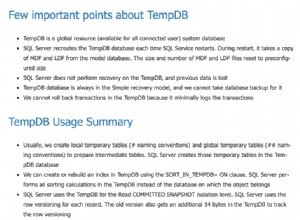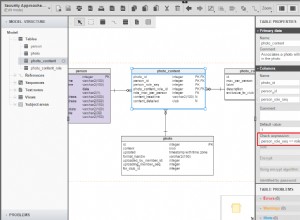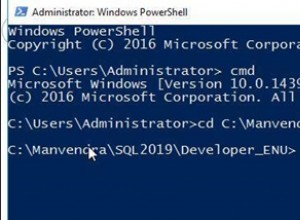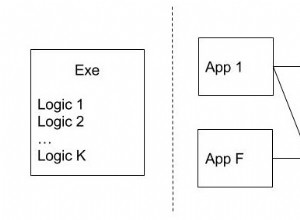¿Por qué estás usando PL/SQL para esto? Por lo que ha dicho que está haciendo algunas matemáticas, ¿por qué no hacer eso en SQL? Esto también será posible con una combinación de INSTR y SUBSTR, pero es más bonito verlo con REGEXP_SUBSTR.
select to_number(regexp_substr(ip, '[^.]+', 1, 1)) * power(2,24)
+ to_number(regexp_substr(ip, '[^.]+', 1, 2)) * power(2,16)
+ to_number(regexp_substr(ip, '[^.]+', 1, 3)) * power(2,8)
+ to_number(regexp_substr(ip, '[^.]+', 1, 4))
, icb.*
, icl.*
from ip_city_block icb
join ip_city_location icl
on icl.locid = icb.locid
where to_number(regexp_substr(ip, '[^.]+', 1, 1)) * power(2,24)
+ to_number(regexp_substr(ip, '[^.]+', 1, 2)) * power(2,16)
+ to_number(regexp_substr(ip, '[^.]+', 1, 3)) * power(2,8)
+ to_number(regexp_substr(ip, '[^.]+', 1, 4))
between icb.startipnum and icb.endipnum
Demostración de SQL Fiddle de salida REGEXP_SUBSTR
Si tienes para hacer esto en PL/SQL debe hacer dos cosas:
- Vea si puede declarar su función como determinista .
- Pruebe y aproveche sub -almacenamiento en caché de consultas .
Parece como si ya estuvieras haciendo 2, pero podrías intentar extender esto usando una cláusula WITH:
with the_ip as ( select get_ip_integer('74.253.103.98') as ip from dual )
select the_ip.ip
, icb.*
, icl.*
from ip_city_block icb
join ip_city_location icl
on icl.locid = icb.locid
join the_ip
on the_ip.ip between icb.startipnum and icb.endipnum




